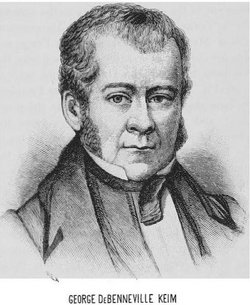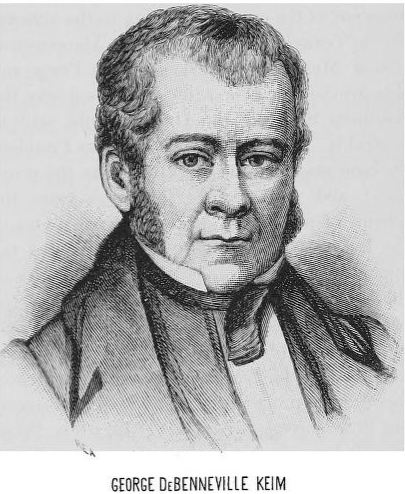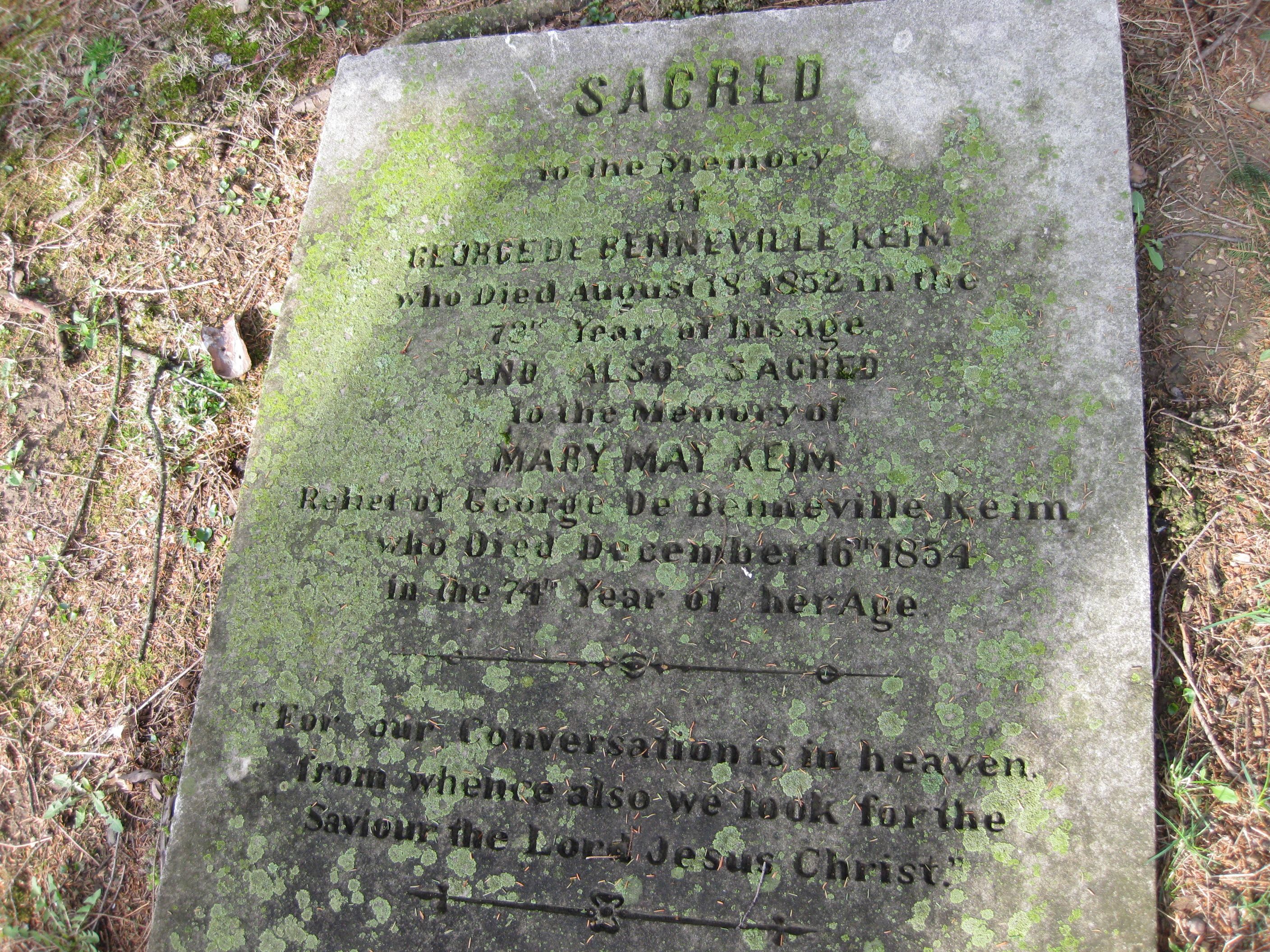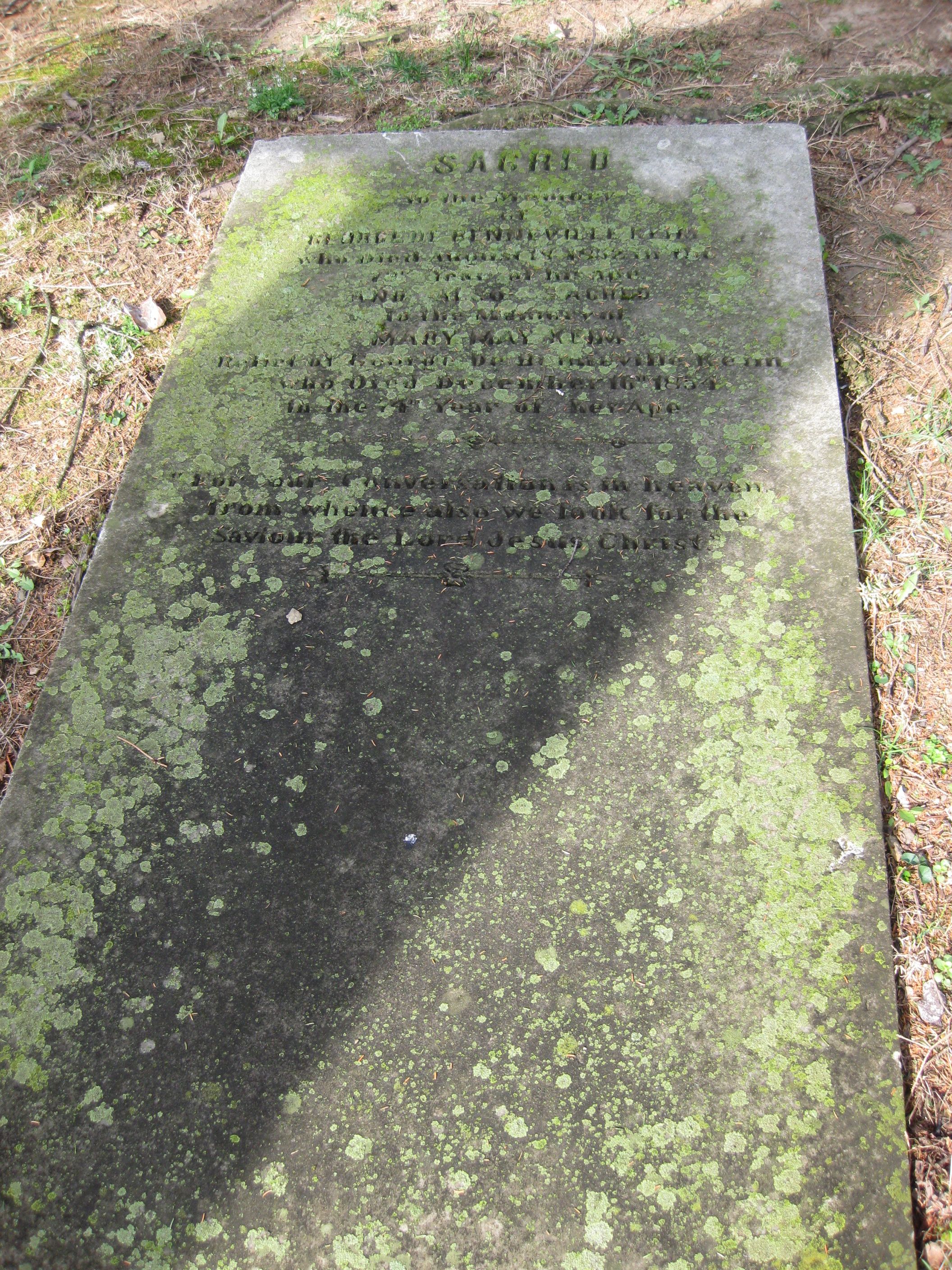George received his education in the school held in the old Friends' meeting house. He was then sent by his father to Philadelphia, entering the large hardware establishment of the Chancellors, in order to familiarize himself with the business.
When he returned to Reading, in his twentieth year, he was taken into partnership by his father, who carried on the business established at what was known as the "old White store." In addition to merchandising, George de Benneville Keim also engaged in the manufacture of iron, being interested in the Reading Furnace and various forges. From 1809 to 1814 he did business in Philadelphia in connection with the export of bread stuffs. Many of his business interests were of direct benefit to this region, not only in the way of furnishing profitable employment to a large number, but also in introducing new industries, thus increasing the resources of the section materially. He was one of the first to attempt the cultivation of the grape and the manufacture of wine; he used his means and influence in raising the quality of the live stock in Berks county; and was active in promoting agricultural interests generally, owning several farms in Exeter township and vicinity.
When the whiskey insurrection broke out, in 1794, Mr. Keim volunteered, serving in the government forces, and he always took the keenest pleasure in military matters. In 1821 he received the appointment of aid on the staff of Governor Hiester, with the rank of colonel. In 1830 he was elected major-general of the 6th Division, Pennsylvania Militia, succeeding his brother-in-law, Hon. Samuel D. Franks; and when he retired, five years later, was succeeded by his son, George M. Keim, who in turn was succeeded by his cousin, Gen. William H. Keim.
He married Mary May d/o James May and Bridget Douglass 4 Feb 1799. They had two sons Gen. George May Keim and Daniel May Keim.
Mr. Keim served as president of the Branch Bank of Pennsylvania for over thirty years; he was one of the promoters of the Reading Water Company and its first president, filling that position for a long period. Mr. Keim was the chief burgess of Reading, served as president of the town council for many years, and was prominent in the development of the county and of Reading, not only in business affairs and as a factor in the local civil government, but also in the promotion of education and other matters affecting the broader development of the community. He took an earnest interest in the establishment of the Reading Academy and the Reading Female Seminary, both of which held an important place in the literary training of the young people of that day.
He died 20 Aug 1852 in Reading, Berks Co., PA. He was buried Aug 1852 in Charles Evans Cemetery in Reading, Berks Co., PA.
George received his education in the school held in the old Friends' meeting house. He was then sent by his father to Philadelphia, entering the large hardware establishment of the Chancellors, in order to familiarize himself with the business.
When he returned to Reading, in his twentieth year, he was taken into partnership by his father, who carried on the business established at what was known as the "old White store." In addition to merchandising, George de Benneville Keim also engaged in the manufacture of iron, being interested in the Reading Furnace and various forges. From 1809 to 1814 he did business in Philadelphia in connection with the export of bread stuffs. Many of his business interests were of direct benefit to this region, not only in the way of furnishing profitable employment to a large number, but also in introducing new industries, thus increasing the resources of the section materially. He was one of the first to attempt the cultivation of the grape and the manufacture of wine; he used his means and influence in raising the quality of the live stock in Berks county; and was active in promoting agricultural interests generally, owning several farms in Exeter township and vicinity.
When the whiskey insurrection broke out, in 1794, Mr. Keim volunteered, serving in the government forces, and he always took the keenest pleasure in military matters. In 1821 he received the appointment of aid on the staff of Governor Hiester, with the rank of colonel. In 1830 he was elected major-general of the 6th Division, Pennsylvania Militia, succeeding his brother-in-law, Hon. Samuel D. Franks; and when he retired, five years later, was succeeded by his son, George M. Keim, who in turn was succeeded by his cousin, Gen. William H. Keim.
He married Mary May d/o James May and Bridget Douglass 4 Feb 1799. They had two sons Gen. George May Keim and Daniel May Keim.
Mr. Keim served as president of the Branch Bank of Pennsylvania for over thirty years; he was one of the promoters of the Reading Water Company and its first president, filling that position for a long period. Mr. Keim was the chief burgess of Reading, served as president of the town council for many years, and was prominent in the development of the county and of Reading, not only in business affairs and as a factor in the local civil government, but also in the promotion of education and other matters affecting the broader development of the community. He took an earnest interest in the establishment of the Reading Academy and the Reading Female Seminary, both of which held an important place in the literary training of the young people of that day.
He died 20 Aug 1852 in Reading, Berks Co., PA. He was buried Aug 1852 in Charles Evans Cemetery in Reading, Berks Co., PA.
Family Members
Advertisement
Advertisement


























